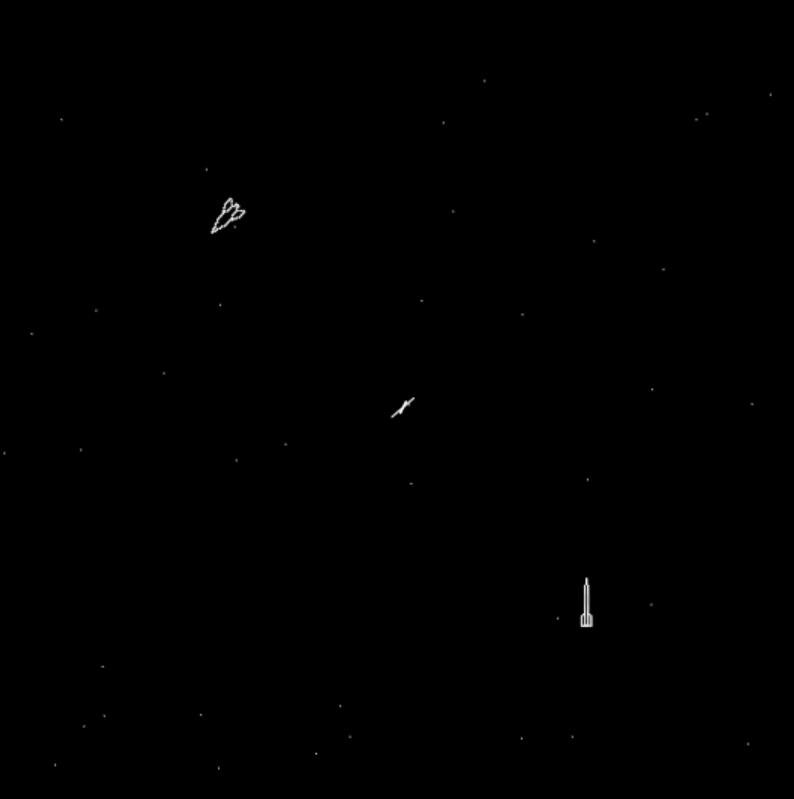I’m a pretty avid gamer. And by “avid gamer” I mean that the last time I tried to remember every game I’ve ever played, the list went on for almost 2 pages. Starting with “Space War” on a DEC PDP-1 at the Johns Hopkins University summer fair in 1972, I’m still pretty active, depending on work commitments. Blogging (ahem!) eats into my gaming time, I have noticed.

Space War
There’s a thing I simply do not understand at all about the gaming world: reviews and opening day crushes. When there’s a new game coming out, it’s not uncommon that the servers go belly up, as everyone rushes to get into the game and…. uh, what? If it’s a game with a persistent world, unless you’re a serious PVP player and you want that extra couple hours to learn the maps and out-grind your friends to get the legendary gear, then it can wait a month. Besides, everyone will have the legendary gear in a month anyway.
When No Man’s Sky came out, I had a copy on pre-order, in spite of the fact that I did not expect it to be very good. I was not disappointed in that regard, unfortunately, but I still felt it was important to try to encourage companies to branch out from the “swing for the fences; hit a blockbuster!” model of the AAA titles. Most of us should be able to sit back and look at what’s happened to Hollywood, as the big studios churn out predictable attempts at blockbusters, one after another, and everyone is disappointed – even Ben Affleck.
When I see a blockbuster coming, I do my little piece to make the problem worse by not buying it. I wait a couple months and get it for half price (or less) used on Amazon or Ebay, or on the “we discovered this really sucks but we’ll take $10 for it” sale on Steam. Or, if it’s a movie, and the only reason one might want to watch it is because of the beautifully rendered 3D explosions: I’ll wait ’till the DVD is out and get it on Netflix or Ebay for a couple bucks. The beauty, to me, of my method is that none of my money goes to the people producing the crap: it’s going to the cutting-edgers who bought it, discovered it sucks, and then tried to recuperate a couple of bucks from their mistake by reselling it.
As I see it, being the first to buy something ought to come with a steep discount because you are taking the risk of finding out that it sucks. Yet, people still line up around the block to be the first person to buy a new iPhone, or whatever. What? Now, if someone told me that I’d get an “early adopter” discount or “guinea pig” bonus for being the first wave of people to put up with some broken game’s overloaded servers – then, we might be talking. Except that there are people who do that for a living already: they are called “reviewers.”

The “HandAlope” is happy because I fed it some carbon
A “reviewer” is someone who gets something, checks it out, and writes their opinion about it. A “critic” is someone who gets something, checks it out, and writes a long-winded well-informed opinion about the thing in its broader cultural context. If I were reading a critic’s commentary on Halo, I’d expect a discourse about how some elements of the plot appeared to be heavily influenced by Voltaire’s Candide. Reading critical analysis we are looking for the deeper meanings and connections – I actually think that, sometimes, they can be there in a game. Certainly, those deeper meanings and connections can be there (ought to be!) in a film. I don’t see a lot of criticism of games, but there sure are a lot of reviewers. Their job is to play the game and warn us if it’s terrible or tell us if it’s good and what’s good about it. Anyone who pre-buys a game, or who wants to be the first on their local Class B subnet to log into some new game’s server, has helped the game manufacturers defeat the game-reviewing system, in the same way that any film critic or movie reviewer who agrees to embargo their review of an advance screening of a movie has helped Hollywood defeat their customers. Another way of saying that is that we, the consumer, have to establish a pretty good idea in our own mind who is the customer and who works for whom.
I was looking forward to the new Mass Effect Andromeda game, but I’ve been detecting rumblings from some early reviews that it may not be so great. That was one I wasn’t going to buy on pre-release anyway because I know the publisher will survive if the game is garbage or not: if it’s good they’ll get my money in the due course of time, discounted (why do they do that!!?) once I have had a chance to learn whether it’s any good or not. I usually play AAA titles a year after they come out, because by then they’re pretty well patched, the servers work (or the game already imploded) and there have been enough patches that it’s pretty stable. And if it’s a “game of the year” type game, you can get the game plus all the downloadable content for what the base game cost.
Imagine if there was a restaurant that charged you a premium for being the first person to try a new dish. And, if you waited a month, you’d be able to read a couple of restaurant critics’ reviews of the dish, and it would cost less. If you go the first night, there will be possibly long lines and the ingredients for the new dish may be unavailable because of the crowd. Why would anyone line up for the grand opening of the new dish?
I don’t understand why the economists aren’t lined up to explain to the game companies how to re-price their games. In my mind it would look something like:
Since 20% of games are bad, purchasers should get a “first day discount” if they are willing to gamble on whether a game is any good or not. So if you buy the game in the first week, it should be $40. After a week it goes up to $50. After a month, once all the servers are load-tested and you release the first stability patch, it should go up to $60. If you win “game of the year” it should go up to $75 and stay there for at least 2 years, while you offer downloadable content on top of it.
Some games, like World of Warcraft, almost implement that model. Doom did, with the “give away the first level” approach. Both games were critical successes and World of Warcraft has had a pretty amazing long-term run. It seems to me that, in games and cinema, the first and best strategy is to make great games and films. Once people are going around to their friends saying, “have you played Whatever?” then the rest is implementation details.
 You can play Space War too! Because simulating a PDP-1 is apparently not that big a deal: [javascript version]
You can play Space War too! Because simulating a PDP-1 is apparently not that big a deal: [javascript version]
“Film”: I rather like the distinction between a “film” and a “movie” – a film being something we expect to learn something, or be provoked or interested by, whereas a movie ought to have big robots, beautiful explosions, and guys in spandex punching eachother. Your use of labels may vary, void where prohibited, contents may have settled, etc.
Halo as Candide: Someone could have real fun with that. But not me. Too much work. I am mentally picturing running through Halo 2, then editing it down, and forklifting the script for Candide on top of it. Il faut cultiver son mjolnir.

Amateur. I’m thinking of doing a Mass Effect 1-3 run through when I finish my current main game (OK, that main one is only 2 years old, Mad Max). I have finished ME1, never did 2 or 3. Also started Earthbound last night.
I might have a slight backlog.
sqlrob@#1:
I might have a slight backlog
Slight!!!
Have you tried “Wing Commander” yet? It’s probably just about ripe… At least you know by now that it’s a critical success.
(I actually did the Wing Commander series about 5 years after it came out. At that time, games event-speed was tied to the system CPU speed, so when I started running a game written for an 8088 on an 80386 it was unplayably fast and I had to install this thing called mo’slo which was a TSR that did nothing but interrupt the processor to slow it down.. Nowadays you can probably play Wing Commander under emulation!)
The last roll player game I played was Leisure Suit Larry on an Apple II.
chigau@#3:
I don’t think that was supposed to be a role-playing game.
That was one of the later Sierra Games products; after the company started to hire guys to write code. Surprise, surprise!
Oh, well.
So Tetris wasn’t role playing, either?
I identified closely with the little square.
chigau@#5:
If you made up a back-story for the square, then it was.
Yes, and ran into the same problem you. I started it on a 386sx 16 and moved to a P5-90. I still do have it through GoG. That’s a dangerous service if you haven’t been there yet. My current PC game that I’m doing is Deponia 4 through them, after that probably Undertale. Thinking of working my way through Ultima after that. (have finished 4/5/6/9, all when they came out, so some of it’s a replay).
I did a back of the envelope calculation a while back, and I had 40+ years worth of games to work through. That guess might even be on the low side, since a lot of them are RPGs.
GoG is like crack for us old computer gamers.
I finally broke down and got the new Master of Orion (I’ve been playing I and II for years) and it is really quite good, but they are still working on some bugs (it’s been out almost a year).
I played Wing Commander when it first came out and loved it. I’ve played the whole franchise and have it in my GoG account. Chris Roberts is the man behind the new Star Citizen. I know a few people that are in the beta for that, and it looks good, but it seems like it’s always going to be in beta.